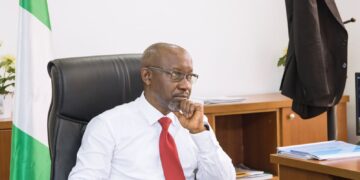
Nigeria’s Gas Minister, Ekperikpe Ekpo
Nigeria-Morocco gas pipeline construction scheduled for 2024
Nigeria-Morocco gas pipeline construction has been scheduled for construction in 2024.
Nigeria’s Gas Minister, Ekperikpe Ekpo, who disclosed this while receiving a delegation of envoys from the Kingdom of Morocco led by its Ambassador to Nigeria, Moha Ou Ali Tagma on Monday, November 27 in Abuja, reaffirmed Nigeria’s readiness and interest in the project.
The Nigeria-Morocco gas pipeline project is a critical infrastructure that spans across 5,600 kilometres, cutting through 13 African countries: Nigeria, Benin, Togo, Ghana, Côte d’Ivoire, Liberia, Sierra Leone, Guinea, Guinea-Bissau, The Gambia, Senegal, Mauritania, and Morocco.
The gas project is expected to transport gas from Nigeria to various West African nations, linking through Morocco and extending to Europe.
While receiving the Moroccan Ambassador to Nigeria, on Monday, Ekpo said:
“I believe by 2024 we will conclude on it. Your company has been relating with NNPC Limited and I have been receiving briefs. We also talked about it during the meeting of the West African Gas Pipeline (WAGP) Committee Parties.
“For the fact that the pipeline existing within that corridor currently is 20 inches; there is a proposal to increase the size after Togo to 46 inches so that the flow will be large enough. Currently, the world is talking about climate change and natural gas is the sure way to go with low carbon emissions, so we have to be serious about the utilization of gas for prosperity.”
The Nigeria-Morocco gas pipeline project is a critical infrastructure that spans across 5,600 kilometres, cutting through 13 African countries: Nigeria, Benin, Togo, Ghana, Côte d’Ivoire, Liberia, Sierra Leone, Guinea, Guinea-Bissau, The Gambia, Senegal, Mauritania, and Morocco.
The gas project is expected to transport gas from Nigeria to various West African nations, linking through Morocco and extending to Europe.
Back in September 2023, the Nigerian National Petroleum Company Limited (NNPCL) highlighted multiple advantages of the pipeline, emphasizing its potential to create wealth, elevate living standards, boost regional economic integration, combat desertification, and notably reduce carbon emissions.
Indeed, the Group Chief Executive Officer of the NNPCL, Mele Kyari, had highlighted the company’s commitment to ensuring a consistent gas supply and also facilitating necessary infrastructure, including the initial compressor station located in Nigeria.
The laying of pipeline will begin at Brass Island in Nigeria and extends to the northern region of Morocco. It will connect with the existing Maghreb European Pipeline originating from Algeria and extending to Spain.
